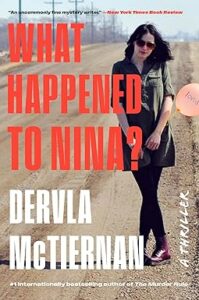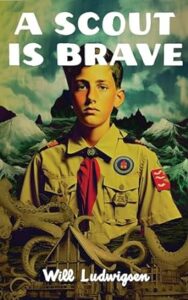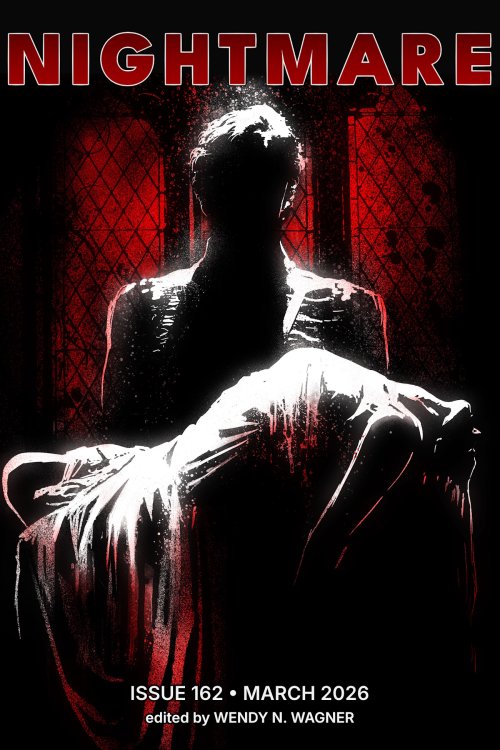The odd thing about genres is that the boundaries between them are not discrete lines, but marshy areas that sometimes possess the characteristics of the landscapes that define the countries on either side. I have often found myself wondering whether specific books are sufficiently fantasy, sufficiently science fictional, or as in the current case, sufficiently horrific to merit coverage by whatever my current reviewer gig happened to be, and sometimes it comes down to the last pages, as in one case where I was unsure that a current thriller had enough of a fantasy bent to fit the magazine I wrote for, and the excuse I found came down to three sentences of a novel a thousand pages long.
What Happened to Nina?
Dervla McTiernan
Hardcover / Paperback / Ebook
ISBN: 9780063042254
William Morrow, March 26, 2024, 336 pages
 Here, we find another case, a thriller about a horrific crime, where the violence is almost entirely off-stage and where the fear is mostly the chill that accompanies an apt portrayal of human misbehavior. Not a horror novel? I have come down to the conclusion that it absolutely is. You won’t find it in the horror sections of big chains that have horror sections, but there’s a long history of crime as horror, of the cold examination of human nature as horror, of the bleak atmosphere involving the uncertainty that envelops the survivors of a family homicide as horror. (And here I seize the opportunity to cite the works of David Goodis, a classic noir novelist who made James M. Cain look positively sunny; his body of work is nothing if not horror, the last pages of his novel The Burglar are nothing if not horror, and it is a small tragedy for the genre that writers with his crystal understanding of evil are not recognized as masters of this particular solar system, as worth our plaudits as works that are easier to categorize within it, because they contain, let’s say, carnivorous worms. You know?)
Here, we find another case, a thriller about a horrific crime, where the violence is almost entirely off-stage and where the fear is mostly the chill that accompanies an apt portrayal of human misbehavior. Not a horror novel? I have come down to the conclusion that it absolutely is. You won’t find it in the horror sections of big chains that have horror sections, but there’s a long history of crime as horror, of the cold examination of human nature as horror, of the bleak atmosphere involving the uncertainty that envelops the survivors of a family homicide as horror. (And here I seize the opportunity to cite the works of David Goodis, a classic noir novelist who made James M. Cain look positively sunny; his body of work is nothing if not horror, the last pages of his novel The Burglar are nothing if not horror, and it is a small tragedy for the genre that writers with his crystal understanding of evil are not recognized as masters of this particular solar system, as worth our plaudits as works that are easier to categorize within it, because they contain, let’s say, carnivorous worms. You know?)
So here’s another case in point: What Happened to Nina?, by Dervla McTiernan (Morrow, $30.00), a crime thriller where the (initial) crime is not the most horrific thing that happens.
Nina Fraser is a teen girl, fun and adventurous, madly in love with Simon Jordan, a rich boy who has been a friend since they met in kindergarten. She’s obsessed with him, and he, with her. Together they go for a romantic make-or-break weekend at his family’s cabin on some hundreds of acres of wilderness in Vermont. He has been showing some attitude lately, some toxicity, that leads her to question whether he’s really a mistake for her. As I say, make-or-break. And when she suffers a minor rock climbing accident, she decides “break.” At the end of the first chapter, written from her point of view, an omniscient narration that seems to know everything that’s about to happen, and the aftermath that will fill the rest of the novel, she makes up her mind to confront him with a breakup.
We then shift to the aftermath, a series of chapters from the competing points of views of the respective families: Nina’s mother Leanne, a local innkeeper; her father Andy, a landscaper; her younger sister, Grace; Simon’s mother Jaime, a trophy wife, “in love with” her husband Rory as a 24/7 transaction secretly putting away money for the to-her inevitable day when he trades her in for a newer model; Rory, a businessman and take-charge type, not inhuman but a possessor of situational ethics when suspicion falls on his son. There is also a local homicide detective, Matthew, alerted when Nina goes missing. Simon has admitted that she’s broken up with him but denies any knowledge of her current whereabouts. One family maintains that the breakup was amicable and that Nina must be off somewhere, missing by volition; the other maintains that Simon has done something of a permanent kind to her.
And here things get dirty. Nobody not involved really knows the answer to the question posed in the title, but as the mystery becomes the latest true-crime sensation, endlessly churned by internet forums and by tabloid news sources, public discourse turns to conspiracies that “must be” true even though there’s not an ounce of evidence to support them: that Nina is out scoring drugs, that her parents are pedophiles and pornographers, that the cops are in on it, and so on. It becomes a hothouse war of attrition, a propaganda war, each family trying in its own way to destroy the other, while the trail grows cold. It all becomes less about what happened, but about what their loved ones are willing to do, about the steps they are willing to take, in the absence of certainty. The mystery is resolved fairly early, but the descent into evil, the ruthlessness in the name of family, the tension that accrues as the outside pressures build, is the true focus, up to the last few sentences and a final act of vindictive cruelty. This is, as far as this judge is concerned, absolutely a horror novel, and Dervla McTiernan delivers the narrative with absolute control of the competing personalities that, in perfect circumstances, never really imagined that they possessed the ruthlessness she portrays. It’s a great book.
A Scout Is Brave
Will Ludwigsen
Ebook
ASIN: B0CRRLHXPR
Lethe Press, July 1, 2024
 Will Ludwigsen’s A Scout Is Brave is a fun, short, and genuinely heartfelt novel about two boys who comprise the only Boy Scout Troop in 1963 Innsmouth, now repopulated with more apocalyptic doings on the horizon. Together, they decide to stop them. The historical moment, most notably the events of November 22nd, very much enter into it. It’s an adventurous little Lovecraftian mythos story, designed to be read quickly but possessing plenty of heart, with demonstrated subtexts that include friendship, hope, the various ideals of the Boy Scout handbook, and the value of hearing from a trusted adult after you have done something nominally bad, like punching a bully or defying an eldritch villain, “You done good.”
Will Ludwigsen’s A Scout Is Brave is a fun, short, and genuinely heartfelt novel about two boys who comprise the only Boy Scout Troop in 1963 Innsmouth, now repopulated with more apocalyptic doings on the horizon. Together, they decide to stop them. The historical moment, most notably the events of November 22nd, very much enter into it. It’s an adventurous little Lovecraftian mythos story, designed to be read quickly but possessing plenty of heart, with demonstrated subtexts that include friendship, hope, the various ideals of the Boy Scout handbook, and the value of hearing from a trusted adult after you have done something nominally bad, like punching a bully or defying an eldritch villain, “You done good.”
• • • •
Movie in Brief: Gangnam Zombie (Lee Film, South Korea, 2023, available streaming), a brief frippery that doesn’t add all that much to its well-worn subgenre. The fast-zombie virus infects an office building, and our hero, a guy who keeps telling us that once upon a time he was a reservist on the nation’s Tae Kwon Do team, isn’t an unstoppable kicker of asses, but a guy who ultimately doesn’t reassure anybody, including himself, with these credentials. (“I’m screwed,” he mutters once, as zombies swarm.) The movie’s just okay, and the last thing we really need in the genre’s current status quo is another merely okay zombie movie, not in a landscape that includes the same country’s Train to Busan. You should not go out of your way. But I will commend the last narrative beat, a circumstance that brings us to the edge of a certain thing that always happens in zombie movies, and leads us to believe that it’s gonna happen again, because that’s rote—but then it departs from formula in a perfectly riotous way that delighted this observer. For that moment, and only that moment, it achieves classic status. Bravo!









